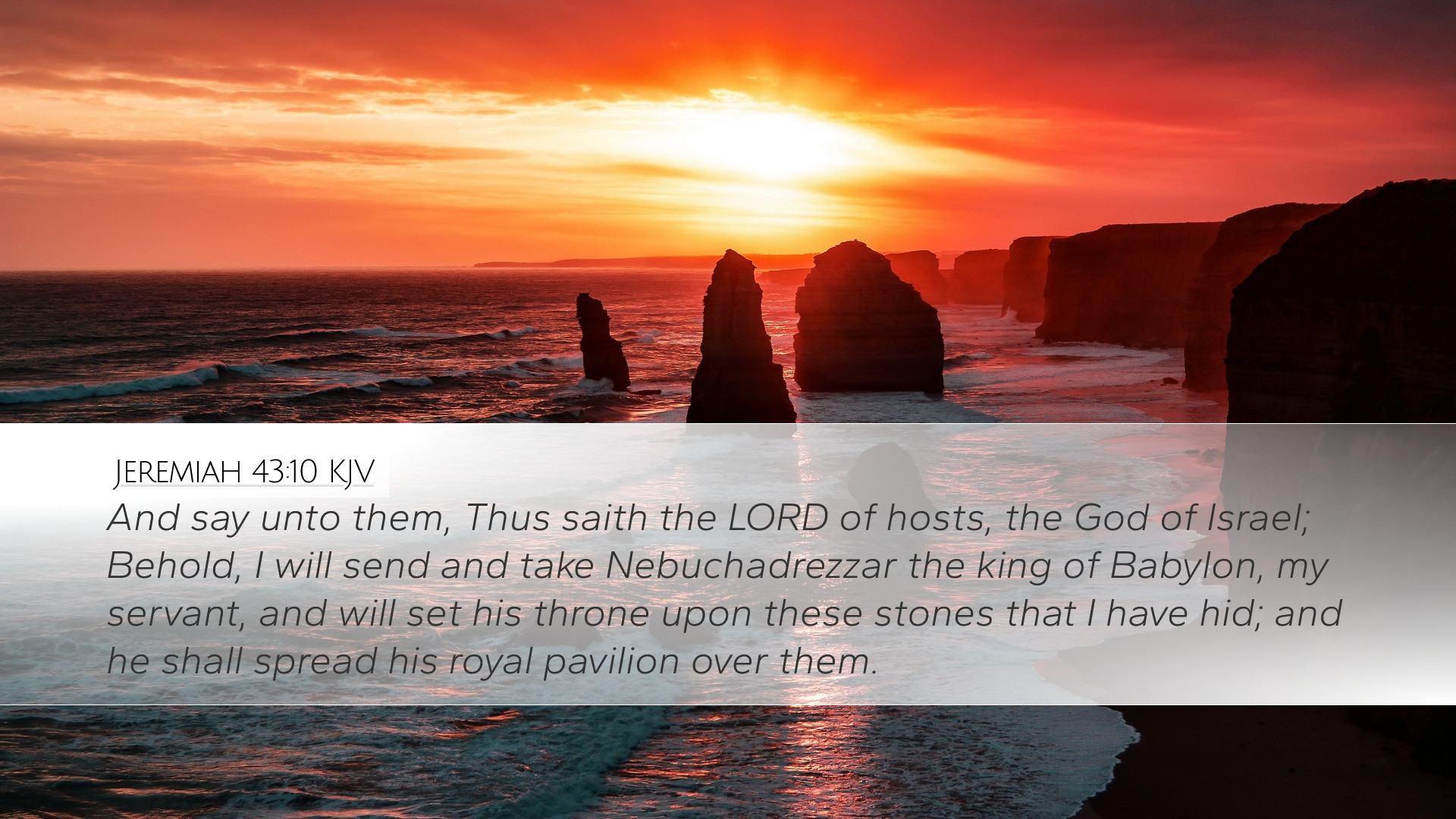Commentary on Jeremiah 43:10
Verse Context: Jeremiah 43:10 states, “And say unto them, Thus saith the Lord of hosts, the God of Israel; Behold, I will send and take Nebuchadnezzar the king of Babylon, my servant, and will bring him against this land, and against the inhabitants thereof, and against all these nations round about; and will utterly destroy them, and make them an astonishment, and an hissing, and a curse; and they shall be consumed.” This verse presents a remarkable proclamation of God’s sovereignty and the role of Nebuchadnezzar as an instrument of divine judgment.
Analysis and Insights
1. Divine Sovereignty:
Jeremiah 43:10 highlights the sovereignty of God as He wields nations and rulers according to His divine purposes. The invocation of Nebuchadnezzar as "my servant" underscores that God can utilize even pagan rulers to fulfill His will. This theme is consistent with instances in Scripture where God uses non-Israelite leaders to achieve His plans, illustrating that His authority extends beyond the covenant community.
2. The Role of Nebuchadnezzar:
Matthew Henry notes that describing Nebuchadnezzar as God's "servant" signifies that he is an agent of God's judgment against the disobedient choices of the people of Israel. Nebuchadnezzar, often seen as a tyrant, is presented as a tool through which God enacts His decisions. This perspective can provoke discussions among theologians about the nature of divine instruments and the complexities of God’s providence in human history.
3. God’s Judgment as Restoration:
Albert Barnes elaborates on the intent of the judgment expressed in this verse. Although harsh, it can be seen as a necessary step towards restoring the covenant community's relationship with God. The destruction serves as a method of purification, allowing for a future restoration that aligns with God’s salvific plan. This dynamic underscores the importance of interpreting divine judgment through the lens of redemptive hope.
Thematic Elements
Several important themes emerge from Jeremiah 43:10 that are significant for pastoral reflection and scholarly study:
- God’s Authority Over Nations: The narrative invites exploration of God’s governance over global affairs.
- Human Responsibility: The implications of the Israelites’ actions leading to judgment provoke reflection on the relationship between divine sovereignty and human agency.
- Judgment and Mercy: The tension between judgment and mercy is a vital theological discussion raised by this passage.
Historical Context
This verse occurs in a critical historical context. The Israelites had turned away from the covenant commands, leading to their impending judgment. Adam Clarke emphasizes the setting of post-exilic tensions, which were rife with fear and doubt among the remaining Jewish population in Judah. Their eventual migration to Egypt demonstrates a lack of faith in God’s promises and a desire to flee into foreign lands instead.
Application for Today
The commentary on Jeremiah 43:10 is rich with implications for contemporary readers. Pastors can draw from it to address themes of faithfulness amidst turbulent times, reminding congregations of God's ultimate power and purpose. It serves as a caution against turning away from God's commands and highlights the importance of obedience.
Students and scholars of theology might explore the intersection of divine sovereignty and human choice, questioning how these elements interact and what they mean for personal faith and community identity.
Concluding Reflections
In conclusion, Jeremiah 43:10 serves as a poignant reminder of God’s overarching sovereignty and the complexities of human rebellion and divine judgment. The insights offered by commentators like Matthew Henry, Albert Barnes, and Adam Clarke deepen our understanding of this intricate passage. Whether reflecting personally, teaching in a congregational setting, or delving into scholarly research, the layers of meaning within this verse invite readers to engage fully with God's word and His plans for humanity.


